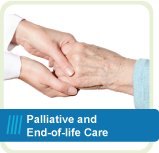Palliative and End-of-life Care
Key Message

 Adopting a palliative and end of life care approach
is an integral aspect of the care for those living with and dying
from any advanced, progressive or incurable condition.
Adopting a palliative and end of life care approach
is an integral aspect of the care for those living with and dying
from any advanced, progressive or incurable condition.
Palliative and end of life care focuses on the person, not the disease and applies a holistic approach to care. It is designed to meet the physical, practical, functional, social, emotional and spiritual needs of patients and carers facing progressive illness, death and bereavement. It advocates an approach which recognises the diversity of life circumstances of people who will need palliative and end of life care and which is responsive to these circumstances, whether they relate to age, disability, gender, race, religion/belief or sexual orientation.
Most practitioners will care for patients who require palliative and end of life care. People often associate this with care for people with cancer. However, patients with other advanced, progressive and life limiting conditions such as Dementia, COPD and Multiple Sclerosis also require palliative and end of life care. Palliative care is not just about care delivered in the last months, days and hours of a person's life but is supporting a quality of life for both patients and those close to them at every stage of the disease process.
What does this mean for the Effective Practitioner?
Effective practitioners support individuals, their family and carers along the entire palliative and end of life journey. Assessment and review of palliative and end of life care needs are recognised in all care settings, at times of diagnosis, at times of changing or complex needs, and at the end of life. Effective communication is essential to understand people's concerns and to provide them with information about their illness, prognosis and treatment options. Effective practitioners also support the psychological, emotional and spiritual well-being of the individual, their families and carers.
The Enriching and Improving experience framework developed by NES and SSSC can help you identify the knowledge and skills required by all workers who may provide care and support to people with palliative and end of life care needs, their families and carers. You can access the framework here.
![]() You can download a copy of
the Palliative
and End-of-Life Care learning activities.
You can download a copy of
the Palliative
and End-of-Life Care learning activities.
Reflection
Remember, recording your reflections is an important part of the learning process. Take time to structure your thoughts, feelings and any future actions on one the forms available in the Reflective Practice section. Click here to visit the page.
In your reflections you could also consider how your learning relates to the Facilitation of Learning, Leadership and Evidence, Research and Development pillars of practice.
Return to topSupplementary Resources
![]() Enriching and Improving Experience
Enriching and Improving Experience
![]() Caring
for People in the Last Few Days and Hours of Life
Caring
for People in the Last Few Days and Hours of Life
![]() NHS Inform palliative care zone
NHS Inform palliative care zone
Signposts
![]() Good life, Good Death,
Good Grief
Good life, Good Death,
Good Grief
![]() Scottish Palliative Care
Guidelines
Scottish Palliative Care
Guidelines
![]() Strategic Framework for Action on Palliative and End of Life
Care
Strategic Framework for Action on Palliative and End of Life
Care
![]() Palliative Care Online Learning
Palliative Care Online Learning
![]() Scottish Government Guidance caring for people in last days and
hours
Scottish Government Guidance caring for people in last days and
hours

